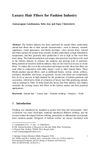 11 citations,
September 1992 in “Journal of pineal research”
11 citations,
September 1992 in “Journal of pineal research” Immunizing goats against melatonin can temporarily change their cashmere growth cycles and increase fleece production.
[object Object]  July 2022 in “New Zealand journal of agricultural research”
July 2022 in “New Zealand journal of agricultural research” The KRTAP27-1 gene variations in sheep may affect wool length and weight.
47 citations,
June 2017 in “The FEBS journal” Disabling the FGF5 gene in sheep leads to longer wool.
7 citations,
July 2019 in “Animals” The KRTAP21-1 gene affects wool yield and can help improve wool production.
1 citations,
August 2024 in “Animals” KRT85 gene variations can help improve wool traits in sheep through selective breeding.
7 citations,
June 2017 in “Gene” Overexpression of FGF5s makes Chinese Merino sheep grow longer and heavier wool.
1 citations,
January 2023 in “Frontiers in genetics” Certain genetic markers linked to wool quality in Rambouillet sheep were identified, which can guide better breeding choices.
 3 citations,
August 2022 in “Archives animal breeding/Archiv für Tierzucht”
3 citations,
August 2022 in “Archives animal breeding/Archiv für Tierzucht” Certain genetic changes in the KAP22-1 gene are linked to better wool quality in Egyptian sheep.
 17 citations,
October 2017 in “Scientific reports”
17 citations,
October 2017 in “Scientific reports” Fine wool sheep have more genes for wool quality, while coarse wool sheep have more for skin and muscle traits.
[object Object]  42 citations,
January 2017 in “Genes”
42 citations,
January 2017 in “Genes” The gene KAP22-1 affects wool yield and fiber shape in sheep.
4 citations,
January 2020 in “Genes” The KRTAP21-2 gene affects wool length and quality in sheep.
11 citations,
July 2021 in “Genetics selection evolution” Researchers found genes and genetic variants linked to sheep wool and skin wrinkles.
The KRTAP36-2 gene in sheep affects wool yield.
98 citations,
May 2016 in “Genes” Understanding wool keratin-associated proteins in sheep can help improve wool quality through selective breeding.
29 citations,
September 2017 in “Genes” Selecting specific KRTAP26-1 gene variants can improve wool quality in sheep.
 5 citations,
November 2022 in “Animal Genetics”
5 citations,
November 2022 in “Animal Genetics” Genomic research can help improve the quality and production of natural fibers in animals.
The KRT84 gene is linked to better wool quality in Gansu Alpine Fine-wool sheep.
 4 citations,
January 2019 in “International journal of molecular sciences”
4 citations,
January 2019 in “International journal of molecular sciences” Genetically modified sheep with more β-catenin grew more wool without changing the wool's length or thickness.
6 citations,
January 2022 in “Gene” Scientists found 53 keratin genes in yaks that are important for hair growth and share similarities with those in other animals.
 6 citations,
January 2016 in “Environmental footprints and eco-design of products and processes”
6 citations,
January 2016 in “Environmental footprints and eco-design of products and processes” The industry should promote pure luxury hair fibers, improve technology, and diversify products to support growers and ensure sustainable use.
38 citations,
May 2000 in “Livestock production science” Giving high-quality protein or methionine supplements helps improve hair growth in Angora goats and, to a lesser extent, in Cashmere goats.
 1 citations,
December 2010 in “InnovAiT”
1 citations,
December 2010 in “InnovAiT” The document concludes that accurate diagnosis and appropriate management are crucial for treating various hair disorders, which have significant psychological impacts.
 17 citations,
November 2017 in “Asian-Australasian journal of animal sciences”
17 citations,
November 2017 in “Asian-Australasian journal of animal sciences” Certain gene mutations are linked to wool quality in sheep and could help in breeding for better wool.
 10 citations,
January 2014 in “Endocrinology & metabolic syndrome”
10 citations,
January 2014 in “Endocrinology & metabolic syndrome” PCOS is a long-term condition that needs more research for better understanding and treatment.

Acidic sandy clay damages archaeological hair the most, while dry conditions preserve but make it brittle; silicone oil can help keep the hair flexible.
 October 2023 in “Cell & bioscience”
October 2023 in “Cell & bioscience” A special gene region controls the re-emergence of a primitive wool type in Merino sheep, improving their wool yield and adaptability.
7 citations,
February 1985 in “Textile Research Journal” Cellular debris sticks to damaged wool fibers and affects wool cleanliness.
 9 citations,
November 2015 in “Key Engineering Materials”
9 citations,
November 2015 in “Key Engineering Materials” Improving skills and technology in Baluchistan's wool industry could boost quality, jobs, and Pakistan's economy.
 18 citations,
January 2013 in “Postepy Dermatologii I Alergologii”
18 citations,
January 2013 in “Postepy Dermatologii I Alergologii” Puberty often causes skin issues like acne and excessive sweating, and treatments require patience as results may vary.
 6 citations,
April 1985 in “Australasian journal of dermatology”
6 citations,
April 1985 in “Australasian journal of dermatology” The cause of the syndrome with scalp scaling and hair loss is unknown.
















